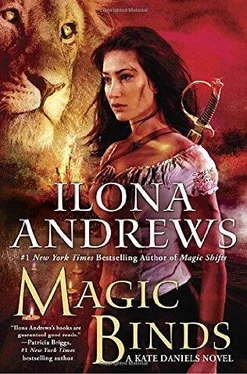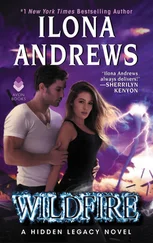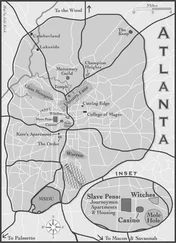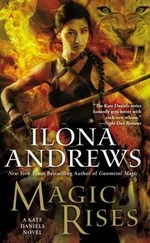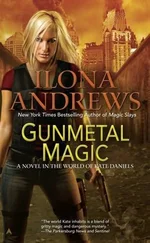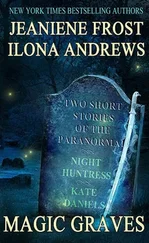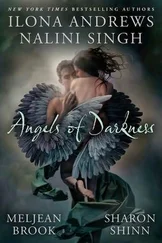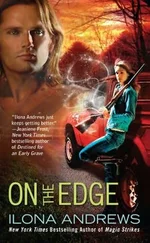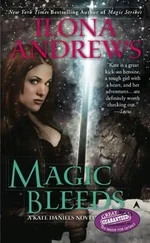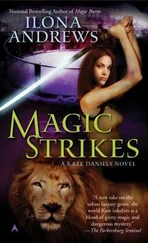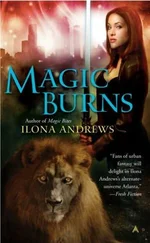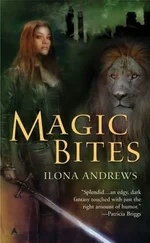My father, master of witty prehistoric sayings. “Yes.”
“I can teach them beauty.”
“They have to learn it themselves.” I pulled out my spare knife. “Tactical Bowie. Hand forged. The blade is 5160 carbon steel marquenched—cooled in a molten salt bath—to strengthen the blade before being tempered. Ten-and-three-quarter-inch blade, black oxide finish. Long, slim, very fast.”
I pinched the spine of the blade with my fingers at the hilt. “Distal taper. The blade thins from hilt to tip. About six and a half millimeters here.” I moved my fingers to the tip. “About three and a half at the tip. Makes the blade lively and responsive. Pick up a sword or a knife without a taper and it will feel clunky in comparison.”
I touched the spine at the point where the blade curved down. “Clip point. Looks like a normal blade with the back clipped a bit. This clip curve is sharpened. If I’m pulling out this knife, I’m fighting in close quarters. This blade profile allows for greater precision when thrusting. It’s a wicked slicer, but it’s an even better stabber. This knife is one single piece of steel. The guard, the hilt, and the blade, all one piece. Simple paratrooper cord for the grip. You wanted elegance in simplicity. Here it is, Father.”
I passed the knife to him.
He held it up and studied it.
“There are countless generations between a simple flint blade and this knife. There is metallurgy, years of experimentation to get the right kind of steel, not too brittle, not too soft. More years to properly temper it. Chemistry. Craftsmanship. Secrets of forging the blade, passed from parents to children, read in books, practiced. Men died for the geometry of this knife. Their deaths helped to refine it into the perfect weapon. This knife represents a wealth of knowledge. But you want to take a big step and simply circumvent the learning process. If you gave this knife to a Cro-Magnon, he would appreciate it. But he wouldn’t know why it worked so well. He couldn’t reproduce it. Even if you taught him how, he would make lesser imitations of it. All that wealth of knowledge would never be acquired.”
“I can make a better knife,” he said.
I sighed. “The knife is good enough, Father. It suits my needs. Even if you tried, your blade wouldn’t be perfect.”
“And why is that?”
“Because you don’t stab people on a daily basis.” Right. Nice going. The next time I came to his castle, he would be stabbing people to learn the perfect knife design.
“You use a car, Kate. Do you know how it was made?”
“No, but I know people who do. We’re talking about the collective knowledge of the people. The knowledge that is a root from which other knowledge grows.” I drank my beer. “I bet if you made a better knife, you would confiscate all knives and replace them with yours, because they were better.”
“They would be.”
“But everyone would have the same knife. There would be no need for progress.”
“So you would rather condemn these same people to generations of trying to learn something I already know.”
I sighed. “Do you want to be the fount of all knowledge?”
“I want these people to experience beauty and prosperity. I want them to have it now. Not tomorrow, not in the future, but now, because their lives are short.”
“If you remove adversity, you remove ingenuity and creativity with it. There is no need to strive to make something beautiful or better if it already is.”
“Life is full of infinite secrets,” he said. “There is always something needing ingenuity.”
“Don’t you want them to have pride? An old man remembers his first knife, compares it to the one his grandson made, and is proud to see how far we’ve come.”
“You are naive, Blossom. Let me build a house on this street. Go out and ask the first fifty people you meet if they would choose to live in the house they have now or the beautiful dwelling I built. Every single one of them will give you the same answer.”
“There is no getting through to you,” I said.
“You are a challenging child. You ask difficult questions.”
“I think I’m a very easy child.”
“How so?” He sipped his beer.
“You never had to bail me out of jail, chase my boyfriend out of my bedroom, or try to console me because I missed my period and cried hysterically, worried that I might be pregnant. Cops were never called to the house because I had a giant party. I’ve never stolen your car . . .”
He laughed. “You almost destroyed a prison that took me ten years to build. And you upset your grandmother.”
“You sent an assassin to kill a baby,” I said. “A baby. My best friend’s daughter.”
“If it helps, I wavered before issuing the order.”
He wavered. Ugh.
“Please tell me that there was something in you that rebelled against taking a baby’s life.”
“No. I wavered because I knew you wouldn’t like it. It would displease you and you would think I was cruel, so I hesitated.”
“You are cruel.”
“Yes, but it doesn’t mean I want you to think I am.”
I shook my head.
“You once told me we were monsters. We are.” Roland smiled at me. “Things are so difficult for you because you’re denying your nature.”
“No, please not another parental lecture on the virtues of evil.”
“Evil and Good are in the eye of the beholder,” he said. “That which benefits the majority in the long run isn’t evil.”
“It is if it comes from the suffering of others.”
“People suffer, Blossom. It’s the definition of our existence.”
Talking to him was like walking in circles. He bent every argument backward.
“You cost me a ten-year friendship.”
“Ten years. A blink.”
“A third of my life.”
“Ah.” He leaned back. “I keep forgetting. You’re so young, Blossom. I ask myself why you were born into this broken age. Why couldn’t you have been born thousands of years ago? You could’ve reached such heights.”
“Nope. I wouldn’t have.”
“Why not?”
“You would’ve killed me.”
He laughed quietly. “Maybe.”
“Let’s be honest, Dad. You’ve killed everyone else. You would kill me as well, except something is preventing you from doing it. I will figure it out.”
“If you died, I would mourn you like I mourned my firstborn,” he said. “That death nearly broke me.”
“It’s so hard to talk to you, because you are the axis on which your universe revolves.”
“Aren’t we all?”
He quirked an eyebrow at me. It was like I stared in the mirror. Crap. I’d been doing that ever since I could remember and here it was. Thanks, DNA.
“You more than others.”
We finished our beers and sat quietly side by side, watching the city.
“Do you intend to go through with this foolish marriage?”
“Yes. You’ll be relieved to know there will be a proper feast.”
“Blossom, come back with me.”
I turned and looked at him. Pain twisted his face.
“Come back with me,” he said. “Leave this behind. Come home with me. Whatever your price, I’ll pay it. We’re running out of time, but it doesn’t have to be this way. Come home. We have so much to talk about.”
All I had to do was get up and walk away with him. He couldn’t kill my son if there was no son. It would be so much easier. All this pressure would disappear. I could bargain for Curran’s life and the city and take my aunt’s place. Become a fully realized monster.
I swallowed a sudden lump in my throat. “I can’t.”
Sadness filled his eyes. “You can’t save everyone, Blossom.”
“This isn’t about saving them. It’s about saving me. If I go with you, I’d have to walk away from everything I stand for. I don’t want to be a monster. I don’t want to murder people or raze cities. I don’t want anyone to cringe when they hear my name. I want to have a life.”
Читать дальше
